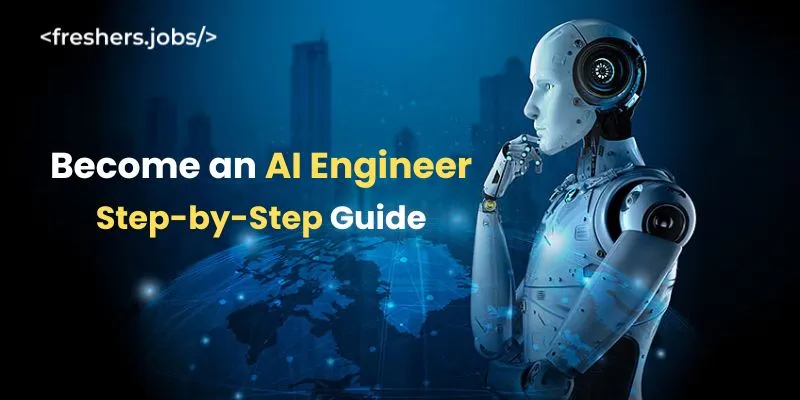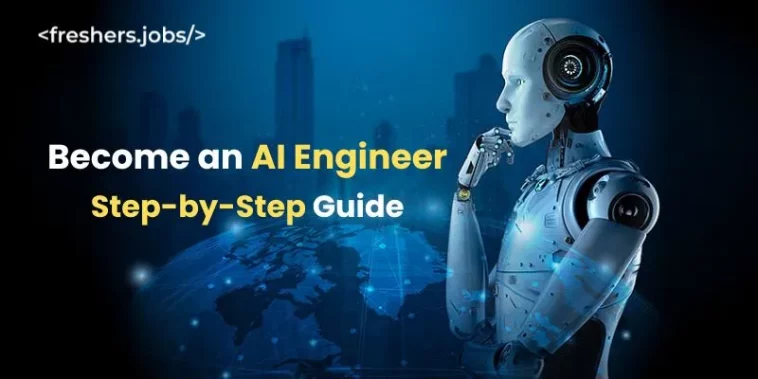Industries from healthcare, finance, IT, entertainment and automotive sectors have been revolutionized by Artificial Intelligence (AI). Demand for AI engineers has been driven upward as companies exploring the use of AI to fuel innovation and performance come into play. A career which combines this state-of-the-art future technology with teaching machines to think is called an AI Engineer. That way, in Freshers Jobs we shall discuss How to Become an AI Engineer: A Step-by-Step Guide.

Who is an AI Engineer?
The job of an AI engineer is to develop algorithms and data processing techniques, enhancing the capabilities of AI systems so they can solve complex problems more efficiently, automate processes or optimize operation. They are pivotal in translating theoretical AI developments to practical real-world applications, making sure the AI systems scale and they remain sustainable, ethically aligned with societal norms as well business requirements.
Artificial Intelligence Engineering is the discipline of designing and developing such artificial intelligent systems. It is the set of tools, frameworks and methods required to successfully implement AI solutions across various industries.
What AI Engineers Do?
The AI engineer constructs these models using ML algorithms and deep neural Networks that are taught to provide organizations with business insights powerful enough for them to change the decisions they make. Such engineers even build weak or strong AIs based on the goals they have in mind. AI engineers know programming, software & data mining. They employ different tools and methods that allow them to work through the data, create AI models or keep it running.
Steps to Become an Artificial Intelligence Engineer
Step 1: Get a Strong Educational Foundation
It is so important for a Career in Artificial Intelligence. At a minimum, an AI engineer holds a bachelor’s degree in computer science or IT with expertise in Mathematics. You have some key subjects that you should be focused on during your studies, such as:
- Mathematics and Statistics: Basics of linear algebra and stats like probability computation is a must to build machine learning models which will be used for solving various problems.
- Computer Science: This field requires an understanding of data structures, algorithms, software engineering, and programming languages such as Python, C++, or Java.
- Data Science and Machine Learning: The fundamental ideas of AI are covered in data science courses, which includes data mining, data analysis, and machine learning.
Ever wondered how to become an AI engineer, Specialized degrees in AI or machine learning are currently offered by many colleges. Participating in these programs can offer focused education and practical experience.
Step 2: Learn Programming Languages and Tools
Programming skills are fundamental to AI engineering. Python is the most widely used programming language for AI and ML due to its simplicity and extensive libraries like TensorFlow, Keras, and PyTorch, which are specifically designed for AI projects. Besides Python, familiarity with other programming languages such as R, Java, and C++ can be beneficial. It’s also essential to understand how to use tools and frameworks that are widely used in the AI software engineer domain, such as:
- TensorFlow: A machine learning platform created by Google that is available as open source.
- Keras: A Python-based high-level neural network API that may be used with TensorFlow.
- PyTorch: A popular open-source deep learning framework developed by Facebook’s AI Research lab.
- Scikit-learn: A machine learning package that gives easy-to-use and effective tools for data analysis and data mining.
Step 3: Pursue Certifications and Advanced Degrees
Certifications and advanced degrees that can give you a competitive edge in the job market. Numerous online platforms offer specialized courses and certifications in AI and ML that can be used to enter as an ai software engineer. Some popular certifications include:
- Google AI Certification: Offers courses on AI basics, machine learning, and more.
- Microsoft Certified: Azure AI Engineer Associate Focuses on AI and machine learning solutions using Microsoft Azure.
- IBM AI Engineering Professional Certificate: Provides training in machine learning, deep learning, and AI applications.
If you are aiming for higher-level positions or specialized roles, consider pursuing a master’s or PhD in AI, data science, or computer science.
Step 4: Apply for Internships and Entry-Level Positions
To work in AI engineering, working experience is everything. Do not get confused On How to Become an AI Engineer or How will I apply my knowledge in this stream, learn from industry professionals, thereby becoming aware of the artificial intelligence in business operations with the information above through internships. Applying as an Intern at a tech company, AI-focused startup or research facility or applying for entry-level roles such as junior machine learning engineer, software developer or data analyst also serve as stepping stones to becoming a full-fledged AI engineer.
Step 5: Develop a Strong Portfolio and Resume
Your portfolio showcases your level of experience and the types of projects you’ve done. Include a host of AI projects to demonstrate your NLP skills, computer vision expertise and tell that you are multifaceted. All your educational background, abilities, qualifications and any experience pertinent to the work should stand out in your resume. Personalize it for each submission, underscoring your qualifications and experiences.
Step 6: Prepare for AI Job Interviews
After following the steps above, tap on Free Alert Job to apply for an entry-level AI software engineer role. AI interviews often have technical and behavioural components. Furthermore, answer questions about AI algorithms alongside illustrating your understanding of machine learning ideas. Practice common AI interview questions and engage in mock interviews to gain confidence. This also sets you apart from other candidates; if a person shows how he could contribute to the company’s AI strategy, it automatically makes you unique.
Becoming an AI engineer is a fulfilling journey that requires dedication, continuous learning, and a blend of theoretical knowledge and practical experience. By following the steps outlined above, such as building a solid educational foundation, mastering programming languages, acquiring certifications, and gaining hands-on experience through internships you can successfully enter the field of AI or as an ai software engineer. As AI continues to revolutionize various industries, the demand for skilled AI engineers will only increase. By staying updated with the latest tech advancements and building a strong portfolio, you can place yourself in this rapidly evolving industry.





